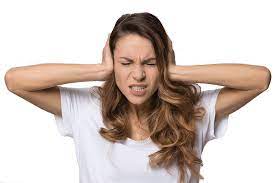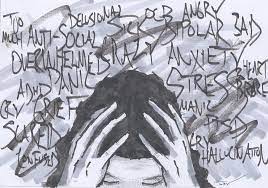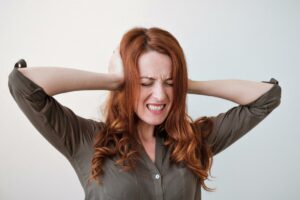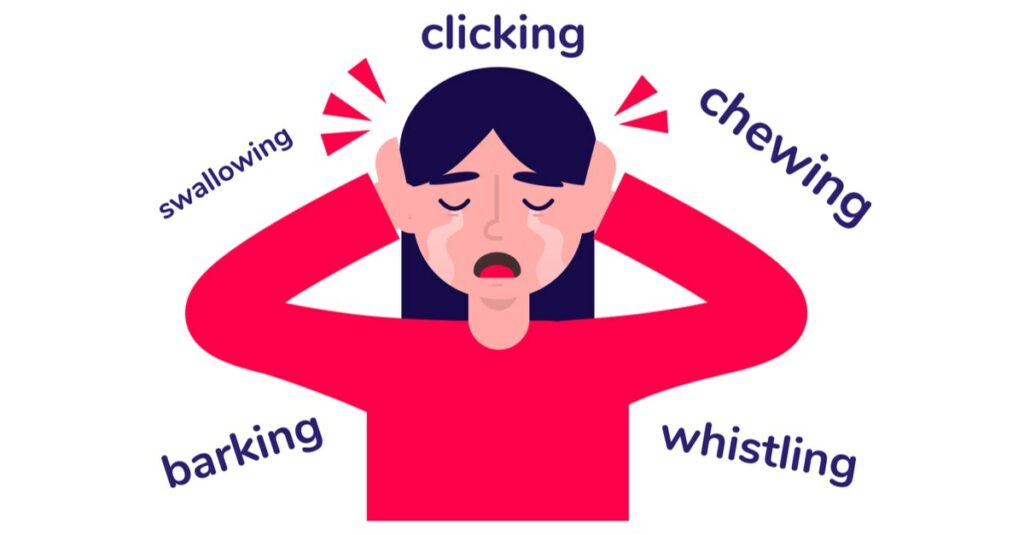Do you have a sensitivity to certain noises? If so, you may be suffering from misophonia OCD. This is a condition that causes people to feel immense anxiety and discomfort when they hear specific sounds. Unfortunately, there is no cure for misophonia OCD, but there are ways to cope with the condition. In this blog post, we will discuss some of the best ways to deal with sensitive ears and manage your misophonia OCD symptoms.
Contents
What Is Misophonia OCD?
 Misophonia OCD is described as a heightened state of anxiety or fear in response to certain sounds. This can include anything from chewing to clicking pens. People with Misophonia OCD often feel the need to escape or remove themselves from the situation entirely.
Misophonia OCD is described as a heightened state of anxiety or fear in response to certain sounds. This can include anything from chewing to clicking pens. People with Misophonia OCD often feel the need to escape or remove themselves from the situation entirely.
For some, this may mean wearing earplugs or headphones in public places. Others might avoid social gatherings altogether. Misophonia OCD can have a significant impact on quality of life.
In simple words, misophonia OCD is an intense dislike or fear of certain sounds. It manifests as heightened anxiety or fear response to triggering sounds. Moreover, people with misophonia OCD often feel the need to escape or remove themselves from the situation entirely.
There are two types of misophonia: primary and secondary. Primary misophonia is when the person experiences dislike or fear towards specific sounds without any known trigger. Secondary misophonia, on the other hand, is when the person experiences dislike or fear towards specific sounds that are associated with a negative event.
For example, the sound of a dog barking may trigger fear in someone with secondary misophonia if they were attacked by a dog in the past. Misophonia can be mild, moderate, or severe. It is important to seek help as it can significantly impact the quality of life.
What Are The Symptoms?
The symptoms and signs of this disorder are not the same for everyone. However, there are some common symptoms that most people with misophonia OCD experience. Some of the common symptoms are:
- A strong and instantaneous negative emotional reaction to a specific trigger sound
- An urge to flee or avoid the trigger sound
- Anxiety, irritability, anger, or rage when exposed to the trigger sound
- Focus on the trigger sound to the point of obsession
- Intrusive thoughts about the trigger sound
It is believed that misophonia OCD is caused by a combination of genetic and environmental factors. There is no cure for this disorder, but there are treatments that can help lessen the symptoms. In fact, studies have found that the signs are similar to those of other anxiety disorders, such as social anxiety disorder, Obsessive-Compulsive Disorder (OCD), and post-traumatic stress disorder (PTSD).
If you think you might have misophonia OCD, it’s important to see a mental health professional who can help diagnose and treat the condition. There are many ways to treat this disorder, and the best treatment plan will be tailored to your specific needs.
Possible Triggers Of Misophonia OCD
 There are many potential triggers of misophonia OCD. Let’s discuss some of the more common ones.
There are many potential triggers of misophonia OCD. Let’s discuss some of the more common ones.
One potential trigger is a certain sound that someone makes over and over again. This can be a particular voice, a type of music, or even just white noise. The key is that it’s repetitive and intrusive.
Another possible trigger is visual stimuli. This could be something as simple as someone moving their lips while eating, or it could be more complex like seeing someone fidget. Also, visual stimuli can include things like fluorescent lights or moving patterns.
There are also certain smells that can trigger misophonia OCD. This is usually a strong, offensive odor that doesn’t go away easily. People are usually very sensitive to these smells, and they can be very difficult to tolerate.
Lastly, there are certain textures that can trigger misophonia OCD. This could be the feel of someone’s clothes, the way their hair feels, or even the way they move. These triggers can be very difficult to avoid, and they can make life very difficult for people with misophonia and OCD. There are also some common emotional triggers that can set off misophonia OCD. These include:
- Anxiety
- Stress
- Fear
If you are struggling with misophonia OCD, it is important to find a way to cope with your triggers. This condition can be very difficult to live with, but there are ways to make it manageable. If you need help, please don’t hesitate to reach out to a mental health professional.
What Are The Consequences?
This condition can cause several problems. Because people with misophonia are so sensitive to sound, they often have a hard time functioning in day-to-day life. Some of the common consequences include:
Isolation
People with misophonia often avoid social situations because they fear being triggered. This can lead to feelings of loneliness and isolation. For example, you may avoid going to restaurants or other places where people make noise. It is believed that this avoidance can worsen the condition. And isolation can be very hard on a person’s mental health.
Difficulty concentrating
It can be hard to concentrate when you’re constantly being bombarded with noise. This can make it difficult to perform well at work or school. Also, in other situations where you need to focus, such as taking a test or giving a presentation, you may find it hard to concentrate. In fact, when you’re feeling anxious or stressed, your misophonia may get worse.
Arguments with loved ones
People with misophonia often have a hard time dealing with the people closest to them. For example, you may get into arguments with your spouse or partner about their eating habits. Or you may get frustrated with your kids when they make noise. These arguments can lead to tension and strain on relationships.
Interpersonal problems
Misophonia can strain relationships. For example, if someone with misophonia is triggered by their partner’s chewing, it can lead to arguments and resentment. In fact, it is not uncommon for people with misophonia to avoid social situations altogether, out of fear of being triggered. You might also have problems with work or school if your misophonia is particularly severe.
Anxiety and depression
 It is believed that the major consequence a person with misophonia experiences is social isolation. When you hear certain sounds, you may have the urge to leave the room or ask the person making the noise to stop. This can make it difficult to be in public places or even around close family and friends. It’s not uncommon for people with misophonia to start withdrawing from social activities and become more isolated.
It is believed that the major consequence a person with misophonia experiences is social isolation. When you hear certain sounds, you may have the urge to leave the room or ask the person making the noise to stop. This can make it difficult to be in public places or even around close family and friends. It’s not uncommon for people with misophonia to start withdrawing from social activities and become more isolated.
So these are some of the consequences that can come from misophonia. Researchers have found that people with misophonia often suffer from anxiety and depression. In fact, one study found that nearly half of all people with misophonia also have OCD.
This makes sense when you think about it. After all, OCD is an anxiety disorder characterized by repetitive, intrusive thoughts and behaviors. So it stands to reason that people with misophonia would also suffer from OCD.
How To Treat Misophonia OCD?
The treatment is necessary and requires a lot of patience, time, and effort. In order to reduce the symptoms, it is important to find a therapist who is experienced in treating OCD. And along with therapies, there are several things that can help reduce the symptoms. Let’s discuss some of the common treatment options.
Exposure and Response Prevention Therapy
This is one of the most effective therapies for treating OCD. The therapist will help you to gradually expose yourself to the trigger sound. And at the same time, you will learn how to control your response to it. Moreover, ERP is a long-term treatment that requires a lot of dedication and commitment.
For example, if your trigger sound is the sound of someone eating, the therapist will help you to expose yourself to it in a controlled environment. And you will learn how to control your urge to flee or react. This way, you will be able to reduce your symptoms and eventually lead a normal life.
Cognitive Behavioral Therapy
CBT is another effective therapy that helps you to understand and change your thought patterns. This therapy can help you to cope with the anxiety and stress that come with having sensitive ears. CBT can also help you to change the way you react to certain triggers. It focuses mainly on the here and now, rather than the past. This makes it an effective treatment for many people who suffer from OCD.
A therapist with CBT will help you to understand your thoughts and feelings about your trigger sounds. Also, this type of therapist will help you to find alternative ways of thinking about your triggers. Studies have found that CBT is an effective treatment for OCD. It can help you to change your thoughts, feelings, and behaviors related to your disorder.
Medication
Medications are not typically used to treat misophonia, but they may be prescribed if your symptoms are severe and interfere with your quality of life. Antidepressants, anti-anxiety medications, and antipsychotic drugs have all been used to treat misophonia, but there is no clear evidence that any of these medications are effective.
You should also discuss any possible side effects with your doctor before starting any medication. Some people with misophonia may also benefit from therapy, either alone or in combination with medication. Moreover, if you have any comorbid conditions, such as anxiety or depression, this should be discussed with your doctor as well.
Support groups
It is important to realize that you are not alone in your struggle with misophonia. There are many other people who suffer from this condition. There are support groups available that can provide you with information and support. Also, it is believed that education about the condition can help to reduce the symptoms.
Moreover, the support groups are different and numerous types of treatments are available to address the disorder. There are also many ways that people have coped with their symptoms. You can find information about all of these things in support groups. Some groups are led by professionals and some are not. Some groups meet in person and some are online.
So, do your research and find a group that meets your needs. Then, give it a try. It could be just what you need to help you cope with your misophonia.
Self-Help Tips To Cope With Misophonia OCD
 Although professional treatment cannot be replaced for misophonia, there are some self-help tips that may also be helpful to cope with your sensitive ears. As with any mental health condition, the first step is acknowledging that you have a problem.
Although professional treatment cannot be replaced for misophonia, there are some self-help tips that may also be helpful to cope with your sensitive ears. As with any mental health condition, the first step is acknowledging that you have a problem.
This may seem like an obvious statement, but it is important, to be honest with yourself about the impact that misophonia has on your life. Here are a few tips that can help you to cope with your misophonia:
Identify your triggers
What sounds cause you distress? Is it a certain voice, type of music, or other noise? Once you know what your triggers are, you can start to avoid them or at least be prepared for when you are exposed to them. Moreover, when you identify your triggers, you can start to challenge your beliefs about them.
For example, if you believe that all voices are triggering, start by listening to calming voices for short periods of time. This may help you to realize that not all voices are bad and that you can start to tolerate them more.
Use earplugs or noise-canceling headphones
If you know you will be exposed to a trigger sound, try to protect your ears with earplugs or noise-canceling headphones. This can help reduce the intensity of the sound and make it more tolerable. For example, if you know you will be going to a restaurant that is usually noisy, bring along earplugs or headphones to help block out some of the noise.
Try to avoid trigger sounds
If there are certain sounds that consistently trigger your misophonia, try to avoid them as much as possible. This might mean changing your daily routine to avoid places or situations where you know you will be exposed to the sound. For example, if you have misophonia triggered by the sound of someone chewing, you might want to avoid eating out at restaurants.
Use relaxation techniques
When you are exposed to a trigger, it is important to stay calm. Relaxation techniques can help you to do this. Try deep breathing, progressive muscle relaxation, or visualization. These techniques can help you to control your body’s response to the trigger and reduce the intensity of your symptoms. Also, it can be helpful to practice these techniques on a regular basis, even when you are not exposed to a trigger so that you are better prepared when you are.
Talk to someone who understands
It can be helpful to talk to someone who understands what you are going through. This could be a friend, family member, therapist, or support group. Talking about your experiences can help you to feel less alone and can also provide you with some helpful coping strategies. It is believed that sharing your experiences with others can also help to reduce the intensity of your symptoms.
These are some tips that can help you to cope with misophonia OCD. If you are struggling with this condition, it is important to seek professional help. A mental health professional can help you to understand your condition and develop a treatment plan that is right for you. With the right treatment, it is possible to manage your symptoms and live a fulfilling life.
Conclusion
To conclude misophonia OCD is simply a matter of learning to cope with your sensitive ears. There are many ways to do this, and it may take some trial and error to find what works best for you. However, with a little patience and perseverance, it is possible to find relief from this condition.
People should not have to suffer from this condition any longer. With the right help and support, they can learn to manage their symptoms and live a normal life. You can also reach out to Therapy Mantra for help with this condition. We are here to help you every step of the way.
We have a team of professional therapists who can provide you with the support and guidance you need to recover from this condition. Contact us today to learn more about our services. You can also book an online therapy or download our free OCD treatment app on Android or iOS.


